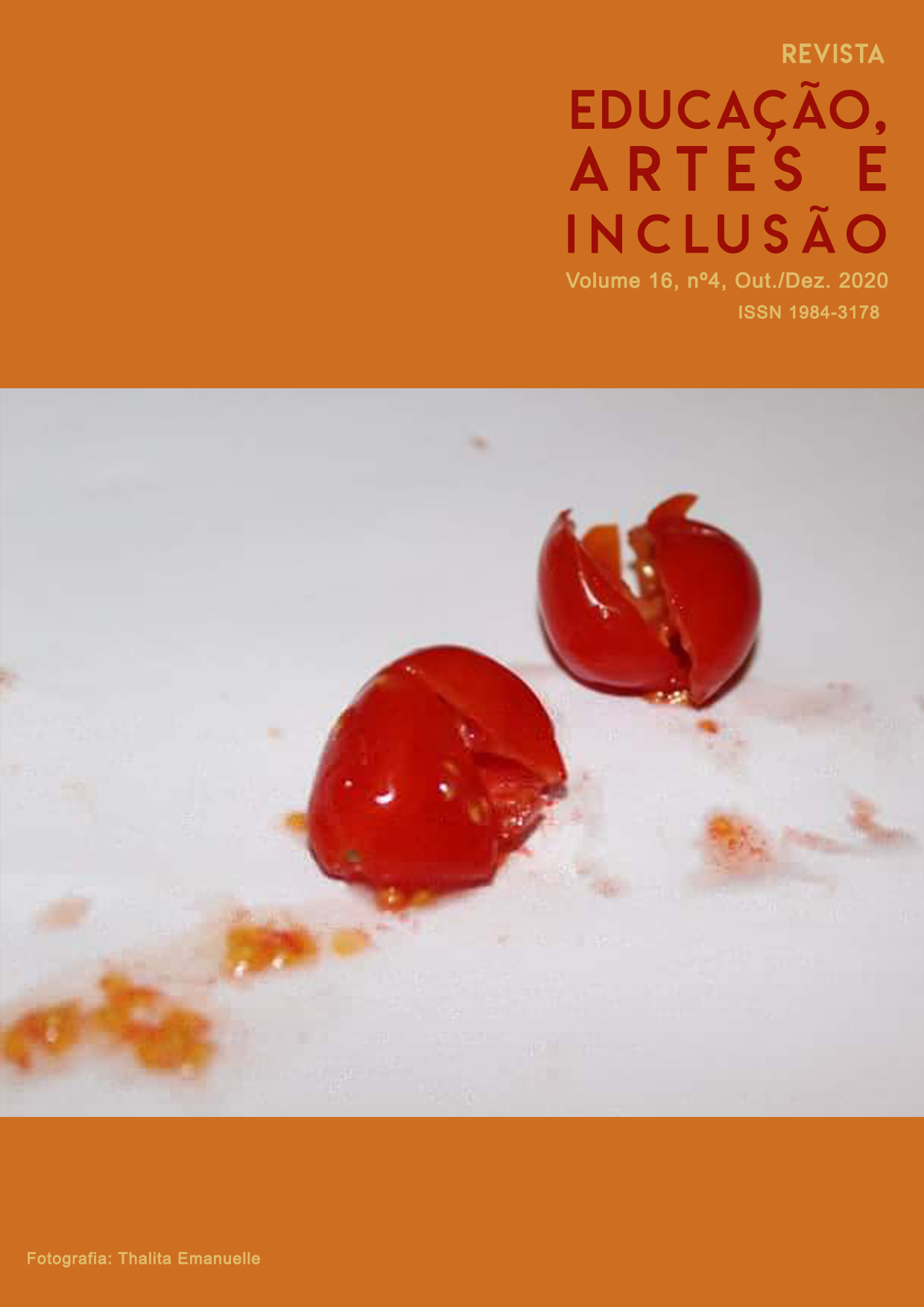A look at the impact of theater experience in the exercise of alterity and in the child socialization process in educational contexts
DOI:
https://doi.org/10.5965/198431781642020143Keywords:
experiência teatral, corpo, materialidades, alteridade, contexto educacional.Abstract
The reflections that follow here dialogue with the post-doctoral research carried out at the Center for the History of Art and Artistic Research (CHAIA), which sought to deepen the idea that the intentional use of different materialities in the paths of theatrical creation mobilizes those involved helping to react to the established experiences, facilitating the interaction between the participants. The article is divided into two central parts: the first contains a presentation of an excerpt of the teaching experience lived with the students of the Basic Education Degree course at the University of Évora, in the discipline Workshop on Integration of Expressions; and the second is dedicated to issues raised by the theatrical work developed with children, in the context of basic education 1st cycle at Escola da Cruz da Picada. The multiple possibilities offered by the materialities at play in the two contexts, open perspectives to participants thinking and doing, to be more inventive and sensitive. As the learning process passes through your body and the other's body, it allows you to experience new forms of community, conceiving alterity in a broader way. The results obtained are aimed at improving the training of teachers and researchers in theater pedagogy in the Brazilian and Portuguese context, building new collaborations.
Downloads
References
ADURENS, Fernanda D. L.; VIEIRA; Camila M. Concepção de professores sobre a inclusão do aluno com autismo: uma pesquisa bibliográfica. Cadernos de Pós-Graduação em Distúrbios do Desenvolvimento. São Paulo, v. 18, n. 2, p. 94-124, jul./dez. 2018. Disponível em: http://dx.doi.org/10.5935/cadernosdisturbios.v18n2p94-124
BEZELGA, I. O Papel das Artes na Promoção do Sucesso Académico: O Prazer de Fazer Acontecer!, Revista Portuguesa de Educação Artística (RPEA) v. 7 n. 1 (2017): RPEA, p.67-78. Disponível em: https://rpea.madeira.gov.pt/index.php/rpea/article/view/52/58
___________ Revisitar os percursos da educação artística para enfrentar desafios: o caso do teatro-educação. Revista Digital do LAV – Santa Maria – vol. 8, n. 2, p. 18 - 47. – mai./ago. 2015. ISSN 1983 – 7348. Disponível em: https://periodicos.ufsm.br/revislav/article/view/19863
CAMARGO, Síglia P. H.; BOSA, Clonice A. Competência social, inclusão escolar e autismo: revisão crítica da literatura. Psicologia & Sociedade. vol.21 no.1 Florianópolis Jan./Apr. 2009. On-line version ISSN 1807-0310. Disponível em: https://doi.org/10.1590/S0102-71822009000100008
FERNANDES L.B; SCHLESENER, A., MOSQUERA C., TEIXEIRA R.M., Ensino de Arte e Autismo: um Relato de Extensão. Revista Educação, Artes e Inclusão, Florianópolis, v. 5, n. 1, s/n. 2012.
LARROSA, J. (org.) Elogio da escola. Tradução: Fernando Coelho - 1ª ed. Belo Horizonte: Autêntica Editora, 2017.
LARROSA, J. Experiência e alteridade em educação. Revista Reflexão e Ação, Santa Cruz do Sul, v.19, n2, p.04-27, jul./dez. 2011.
LEMOS, E. L. M. D. A. Inclusão de crianças autistas: um estudo sobre interações sociais no contexto escolar. Dissertação de Mestrado. Universidade Federal da Paraíba, João Pessoa, 2012.
MENDONÇA, C.S. Preliminares: sobre Infância, Corpo, Educação e Teatro. Paisagens educativas do ensino de teatro na Bahia: saberes, experiências e formação de professores. Cilene N. Canda e Celida S. Mendonça (Org.), Edição: 1ª ed. Salvador, EDUFBA, 2018, p.267-286.
____________ Teatro na Escola Pública: Um direito! Cadernos do GIPE-CIT: Grupo Interdisciplinar de Pesquisa e Extensão em Contemporaneidade, Imaginário e Teatralidade / Programa de Pós-Graduação em Artes Cênicas – Salvador (BA): UFBA/PPGAC, Nº35, 2015, p. 08-24. Disponível em: http://www.ppgac.tea.ufba.br/wp-content/uploads/2016/03/GIPE-CIT-N35-2015.pdf
_____________. “Sobre importâncias: saboreando materialidades no processo de criação cênica”. In: Anais do IV Colóquio Internacional de Educação e Contemporaneidade, 2010, São Cristóvão – SE, 2010.
RYNGAERT, J.P. Jogar, representar: práticas dramáticas e formação. Tradução: Cássia Raquel da Silveira. São Paulo: Cosac Naify, 2009.
SALLES, Cecília Almeida. Gesto inacabado – processo de criação artística. São Paulo: Annablume, 1998.
____________________. Redes da criação: construção da obra de arte. 2ª ed. Vinhedo: Horizonte, 2008.
VIEIRA-RODRIGUES, M. de M.; SANCHES-FERREIRA, M. M. P. A inclusão de crianças com necessidades educativas especiais no ensino regular em Portugal: a opinião de educadores de infância e de professores do 1º ciclo do ensino público e privado. Rev. Bras. Ed. Esp., Marília, v. 23, n. 1, p. 37-52. jan./mar. 2017. Disponível em: <http://www.scielo.br/pdf/rbee/v23n1/1413-6538-rbee-23-01-0037.pdf>. Acesso em: 22 fevereiro 2020.
Downloads
Published
How to Cite
Issue
Section
License
Copyright (c) 2020 Celida Salume Mendonça, Isabel Maria Gonçalves Bezelga

This work is licensed under a Creative Commons Attribution-NonCommercial 4.0 International License.
Copyright Statement
The Educação, Artes e Inclusão is a journal that follows the Free Access Policy. The articles published by the journal are free of charge, intended for educational and non-commercial applications. The articles whose authors are identified represent the expression from the point of view of their authors and not the official position of the Educação, Artes e Inclusão Journal or the Educação, Artes e Inclusão Research Group.
Authors who publish in this journal agree to the following terms:
(A) Authors retain the copyright and grant the journal the right of first publication, with the work simultaneously licensed under the Creative Commons Attribution License which allows the sharing of the work with acknowledgment of authorship and initial publication in this magazine.
(B) Authors are authorized to take additional contracts separately, for non-exclusive distribution of the version of the work published in this journal (eg publish in institutional repository or as a book chapter), with acknowledgment of authorship and initial publication in this magazine.
(C) This journal provides public access to all of its content, as this allows for greater visibility and scope of published articles and reviews. For more information on this approach, visit the Public Knowledge Project.
This journal is licensed under a Creative Commons Attribution-NonCommercial-ShareAlike 4.0 International License. This license allows others to remix, adapt and create from your work for non-commercial purposes, and although new work must give you due credit and cannot be used for business purposes, users do not have to license such derivative works under the same terms.



